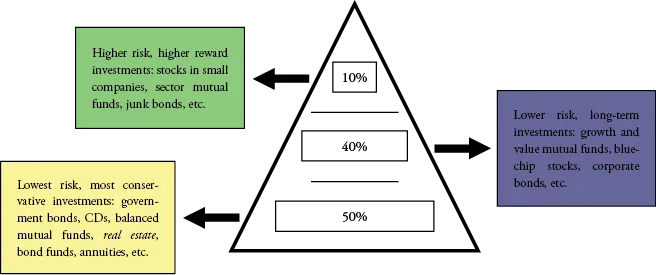
eBook - ePub
Building Wealth
An Insider's Guide to Real Estate Investing
Charles Hibble
This is a test
Share book
- 82 pages
- English
- ePUB (mobile friendly)
- Available on iOS & Android
eBook - ePub
Building Wealth
An Insider's Guide to Real Estate Investing
Charles Hibble
Book details
Book preview
Table of contents
Citations
Frequently asked questions
How do I cancel my subscription?
Can/how do I download books?
At the moment all of our mobile-responsive ePub books are available to download via the app. Most of our PDFs are also available to download and we're working on making the final remaining ones downloadable now. Learn more here.
What is the difference between the pricing plans?
Both plans give you full access to the library and all of Perlego’s features. The only differences are the price and subscription period: With the annual plan you’ll save around 30% compared to 12 months on the monthly plan.
What is Perlego?
We are an online textbook subscription service, where you can get access to an entire online library for less than the price of a single book per month. With over 1 million books across 1000+ topics, we’ve got you covered! Learn more here.
Do you support text-to-speech?
Look out for the read-aloud symbol on your next book to see if you can listen to it. The read-aloud tool reads text aloud for you, highlighting the text as it is being read. You can pause it, speed it up and slow it down. Learn more here.
Is Building Wealth an online PDF/ePUB?
Yes, you can access Building Wealth by Charles Hibble in PDF and/or ePUB format, as well as other popular books in Business & Real Estate. We have over one million books available in our catalogue for you to explore.
Information
Chapter 1
Designing Your Own Real Estate Investment Strategy
Now it’s time to develop a real estate investment strategy that fits your investment goals, your investment style, your current financial situation, and even your special skills, talents, and interests.
First, when developing a workable strategy, ask yourself the following questions:
- Does your current schedule provide time to build sweat equity or manage a property?
- Do you want to be a landlord?
- Does property ownership fit your lifestyle, i.e., do you travel a lot, etc.?
- Does property ownership fit into your overall investment strategy?
- Does property ownership reflect your investment style?
- Other than cash, what skills, talents, and/or interests do you bring to the table?
By answering these six questions, you’ll develop a better feel for how real estate investments can best fit into your life and know which investments are suited for your investment style, lifestyle, and personal traits and characteristics.
Next, think about your current investments and your approach to investing in general. Let’s take a quick look at some investment fundamentals to keep in mind when designing your personal real estate investment strategy.
Diversification
Diversification is nothing more than “Don’t put all your eggs in one basket.” (Mom was right!) Diversification is an important consideration in the development of any collection of assets—stocks, bonds, mutual funds, CDs, and gold coins—how you divvy up your assets (your investment portfolio) counts when it comes to making money.
Many financial gurus use the pyramid model to describe how a diversified asset portfolio might look.

A conservatively diversified investment portfolio
If you have a greater risk tolerance or a twenty- to thirty-year time horizon before you intend to dip into your savings, you might want to juice up the top and middle layers of the pyramid to generate more reward at some increased risk.
Look at your assets—your IRA, 401(k), stock, and bond holdings—all paper assets. A small investment in real estate diversifies you out of paper and into something tangible—real estate. It’s a different kind of investment in a completely different market (from stocks and bonds), and plain and simple, real estate adds real diversification to virtually any collection of paper assets.
Preservation of capital
Straight up? Hold on to what you got. The last thing you want to do is worry about your nest egg losing value. Real estate is a terrific investment for investors concerned about keeping what they have and those with short investment time horizons.
Real estate investments help preserve capital in several ways:
- Property holds its value better, even when the stock and bond markets are tanking.
- Property usually increases in value at a faster rate than paper assets.
- Property offers flexibility to you, the private investor, by providing a number of investment strategies for changing financial times and your personal circumstances, i.e., rental property for monthly income to buying houses to fix up and sell quickly.
Property ownership is not only one of the best tools for growing wealth but also one of the best tools for preserving what you’ve already got.
Leveraging
Leveraging is simply using other people’s money to make money for yourself. Your home is a perfect example. You put down a small amount of money on your home and borrowed the rest from a mortgage lender. Now, ten years later, your home is worth twice what you paid for it. So who keeps all of that increase in property value? You, the smart investor.
Let’s say you put down $10,000 on your home when you bought it for $120,000 ten years ago. Today, the house is appraised at $200,000. In fact, you made a profit of $80,000 on a $10,000 outlay. You put up $10,000 and walk away with $80,000 when you sell. That’s the power of leveraging—one of the most appealing aspects of real estate investing.
Increased control of your investments
Buy $5,000 of IBM, and you’re at the mercy of IBM’s management to make the right business decisions and to operate ethically and legally. (Remember Tyco, WorldCom, Enron, etc.) You have no control over your investment dollars.
Invest that same $5,000 in a fixer-upper—fix it up and sell it for a tidy little profit. It’s your investment, your money, and you’re in control.

Where’s your money now?
Before entering the investment real estate market, it’s always a good idea to figure out where you are at the moment—what financial experts call a portfolio analysis, which is just a fancy way of asking, “How much money do you have, and where is it?”
If you’ve got money in anything from a passbook savings account to mutual funds, to stocks and bonds, to cash stuffed in a coffee can, guess what? You have an asset portfolio. So step one in becoming a real estate investor is to analyze your current financial situation.
A fresh coat of paint, a bit of landscaping and a good cleaning can lead to big profits.
Pay particular attention to the following:
- How much cash you have available. This is called your liquidity. Money stashed in an IRA, 401(k), some annuities, and other investments isn’t liquid, that is, you can’t get at it without paying some really stiff penalties. So focus on things like stocks and bonds (outside of your IRA), CDs and other cash instruments, money market accounts, passbook savings, and the cash buried in the backyard—money you can inve...